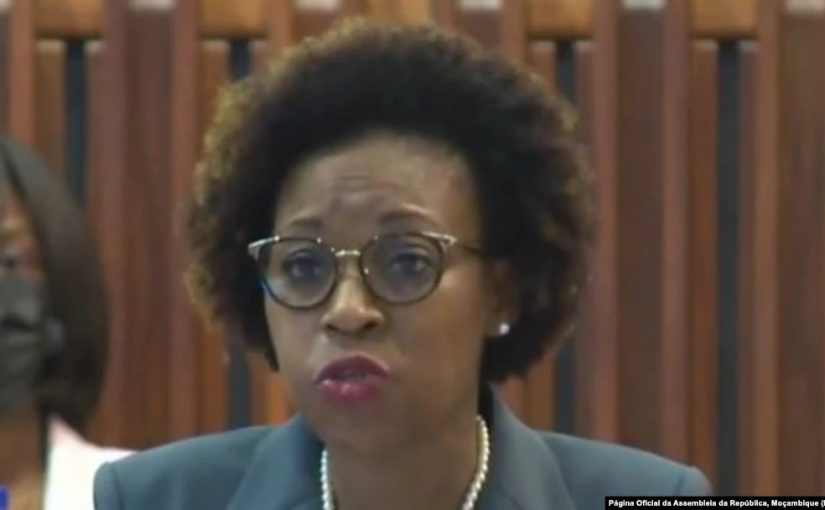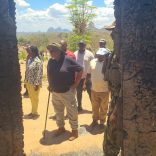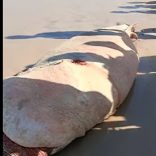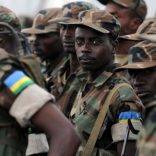Mozambique: Victims of terrorist raid call for urgent food aid - AIM
Mozambique: 58 people charged with terrorism offences – AIM report

Photo: Voa Portugues
Mozambican prosecutors charged 58 people with crimes of terrorism in 2020, Attorney-General Beatriz Buchili told the country’s parliament, the Assembly of the Republic, on Wednesday.
Also read: Mozambique: 36 criminal cases opened last year related to Military Junta armed violence
In her annual report on the state of justice in Mozambique, Buchili said the 58 were included in 13 separate cases. In four of these, charges have been drawn up, and the other nine are still at the stage of preparatory investigation.
The most intriguing of these cases concerns 12 Iranian citizens, whose boat was intercepted in December 2019 by the Mozambican defence and security forces off the coast of Cabo Delgado province. Initially, it was believed that they were drug traffickers, who set their boat on fire in order to destroy the 1,500 kilos of heroin it had supposedly been carrying.
But the current charge sheet against the Iranians does not mention drug trafficking. It accuses them of terrorism, the possession of illegal weapons, conspiring against the Mozambican state and against public order and tranquillity, and membership of a criminal organisation.
Thanks to information contained on an Iranian cell phone, the Mozambican forces discovered that the boat had been carrying a consignment of firearms and ammunition (including AK-47 assault rifles, machine guns and pistols).
Because of this electronic evidence, and statements made by the captured Iranians, the prosecutors reached the conclusion that the Iranians had come to Cabo Delgado to supply guns and ammunition to the islamist terrorists who have been operating in the province since October 2017.
The case was sent to the Cabo Delgado provincial court in November 2020 – but the trial was delayed because the Iranians claim they cannot speak Portuguese, and no interpreter could be found to translate between Portuguese and Farsi.
Also read: Mozambique: Trial of 12 Iranians accused of terrorism postponed for lack of translators
Buchili revealed that the Cabo Delgado court last year heard a case against eight people accused of recruiting youths for the terrorist groups in the provincial capital, Pemba, and providing the jihadists with logistical support. Four of the accused were sentenced to two years imprisonment while the other four were acquitted for lack of evidence.
Also in mid-2020, ten people detained by the defence and security forces in Macomia district were accused of armed attacks. Nine were convicted and sentenced to seven years imprisonment while one was acquitted. Buchili’s report gave no further details.
Other people recruited into the terrorist groups risked a journey to Cabo Delgado in an overcrowded boat, which sank off the coast of Pemba in February this year. Buchili said the boat had been carrying 48 people from Memba district, in the neighbouring province of Nampula, who intended to join the terrorist groups at Tembuzi island, in the Cabo Delgado district of Mocimba da Praia.
When the boat capsized, 13 of its occupants drowned, and the other 35 survived. Buchili said charges are being drawn up against 25 of them, but the case is still in the phase of preliminary investigation.
Some of the major terrorism cases are unlikely to come to trial, because the accused are “persons unknown”. One such case is the attack, on 31 January 2020, against the small town of Bilibiza, in which the raiders burnt down the Bilibiza Agricultural Institute and several houses, attacked the local police station and murdered several people
Another is the attack against the town of Mocimboa da Praia on 23 March 2020. The terrorists murdered local residents, and looted the town, sacking the district administration offices, the administrator’s residence, the Mocimboa da Praia court, and the town’s banks. Several people were kidnapped and their fate is unknown.
These attacks are under investigations, Buchili insisted, but unless witnesses come forward and identify the raiders, it is hard to see such cases coming to court.
Another Cabo Delgado case against “persons unknown” concerns the abduction on 7 April 2020 of Ibraimo Mbaruco, a journalist on the Palma community radio, who was snatched from the street as he was going home. This was a case of kidnapping, said Buchili, noting that immediately before his abduction Mbaruco sent a text message to a colleague saying he was surrounded by people in military uniform.
Also read: Mozambique: No sign of journalist Ibraimo Mbaruco for a year – Carta
Mbaruco has not been seen since, and it is not known whether he is alive or dead. At least Buchili’s report confirms that the matter is still under investigation.
Buchili said the terrorist groups “armed with sophisticated weaponry and information and communication technology, make use of the weaknesses of our land and sea borders, as well as the socio-economic vulnerability of some citizens, mostly young people, to facilitate their operations”.
“We must strengthen our institutional capacities, to guarantee the protection of our borders”, she urged.
She added her voice to the appeals that young Mozambicans “should not join these criminal groups, or provide them with any kind of support or assistance”.
Buchili pointed out that terrorism is an international phenomenon, and terrorist organisations often have members and cells in several countries “to coordinate and communicate their activities, and to receive and transfer money and other assets”.
Mozambique, she said, should therefore continue to cooperate with other countries to combat terrorism and other forms of organised crime.
Also read: Mozambique: Attorney-general creates team to investigate terrorism












Leave a Reply
Be the First to Comment!
You must be logged in to post a comment.
You must be logged in to post a comment.